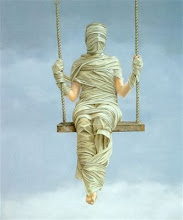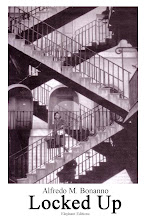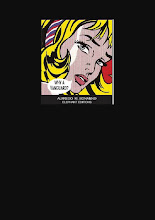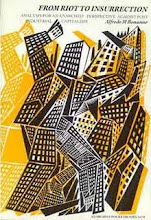Original title: L’utopia propulsiva, ‘ProvocAzione’ no. 1, January 1987, p.6
Some of us have lived through similar moments.* The incredible thunderbolt of a propelling idea suddenly surges from the grey monotony of everyday life. A desire to be beyond the abyss, well beyond it.
Many have lived through this and systematically put it out of their minds. A tiny minority of old regulars at meetings and demos continue to practice the liturgy of the incredible within the enclosure of themselves, now convinced that the utopian proposal must come from rewriters of theories clever enough to climb mountains within the four walls of their own rooms.
The others are not even worth mentioning. Most of them had no inkling of what one was dreaming about. They casually confused possibilism with socialism in an indigestible mixture known as ‘democratic radicalism’.
But propulsive utopia, the lifeblood of the real movement, cannot be found in books or even in the avant-garde theses of the elite philosophers that clock in to the factory of prewrapped ideas like clever shiftworkers.
It feeds off a hidden but burning collective desire, increasing its flow in a thousand ways. Then suddenly you find it at the street corner. The form it takes is not usually staggering. It is often shy and unsure of itself and certainly does not conjure up a vision of lightning on the road to Damascus. But for anyone able to read between the lines of the real movement this and only this is the strong point of a phenomenon that runs into a thousand rivulets, threatening to break up its unity in models worthy of a hasty gazetteer.
Here and there, in the recent students’ and railway workers’ demonstrations in France, the slogan of great revolutions that we were resigned to seeing diluted for ever into parliamentary speeches and pub talk suddenly reappeared: Equality.
The real movement is finding itself in a little path in the forest by pointing to a great utopian objective: go beyond rights to the full reality of the deed.
A swallow does not mean spring, you might say. Correct. A banner, a thousand banners are only words cried to the winds and are often blown away by it. But words are not born inside stuffy libraries. When they correspond to the spirit of thousands of people they suddenly break into the collective consciousness that is the basis of the real movement. Then and only then do they abandon their symbolic purpose and become a simple covering over reality. They become the substance of a project that is latent but at the same time is powerfully operative.
Today the macabre spectacle of equal rights is suffocating any desire that glances beyond the barrier of the ready-made. But the student movement’s refusal of politics is only a filter for the profound, utopian request for immediate, total liberation. Out with all schemers, in with freedom. Right. But when this freedom does not have a bodily content, when it becomes a covering over well (or badly) construed words, then it is no more than a new way of sealing up ideology.
Of course the struggle of those enclosed in the ghettoes, prisons, factories, schools, racial and sexual discrimination, only aims at breaking down the first barrier, the wall, the immediate enemy that one comes up against in painful social discrimination. But although comprehensible, that still does not correspond to a revolutionary struggle for the equality of all, with the maximum exaltation of the difference of each one. No matter how well it goes, the particular struggle will be recuperated and transformed into further conditioning because it is still a struggle for equal ‘rights’ and does not affect situations of fact that are anything but equal so long as there remains a field of political, therefore social, discrimination.
The statement that appeared in the streets of Paris showed a serious attempt to go beyond the trap the ideologues built long ago, conveniently camouflaging it in the suggestion that students beware of outside elements, politics, provocateurs, etc. This is an old story that the managers of power always circulate at opportune moments because they are indirectly in control through the channels of consensus and the conditioning of information. It is a technique they use to warn against dangers relating to one part of themselves so as to detract attention from another part that they want to bring into effect.
Now, by opposing genuinely revolutionary opposition to such underhand plots the real movement is rediscovering the explosive potential of utopia. It is acting in such a way that its radical critique of the process of recuperation cannot be recuperated. It is no coincidence that this position has appeared at a time when economic claims are diminishing in importance. There equality was seen as the result of the repartition of produced value beyond the endemic division between capitalists and proletarians. But we are sure that any society that were to pass more or less violently from capitalism to post-revolutionary socialism through the narrow door of syndicalism would necessarily be a grey parody of a free society. The heavy trade union self-regulating mechanism with its ideal of the good worker and the bad skiver would be transferred to society as a whole. The students have faced the problem of the impossibility of any outlet in the labour market. But their analysis strengthens (or should strengthen) the conviction that only with a radically utopian way of seeing the social problem will it be possible to break through the boundaries of a destiny that those in power seem to hold in their hands. Theirs is certainly not the kind of equality that is being talked about in France today. The same goes for the railway workers, perhaps in an even more obvious way as they make no reference to arguments of an economic or at least wage-claiming kind.
Why, one might ask, are we so sure of the revolutionary content of an idea that, after all, has moved with varying fortunes in the world revolutionary sphere for at least two hundred years? The answer is simple. The propulsive value of a concept cannot be understood in social terms if one limits oneself to examining existing conditions. In fact there is no causal relationship between social conditions and a utopian concept. The latter moves within the real movement and is in deep contrast to the structural limits that condition but do not cause it. On the contrary the same concept can move around comfortably in the fictitious movement. Here, in the rarefied atmosphere of the castle of spooks the utopian concept, having become devoid of meaning, is no more than a product of ideology like so many others. Research into the causes of utopia or rather utopian desire could certainly be interesting but would give poor results if one were to limit oneself to studying the social and historical conditions in which the concept suddenly appears.
For this reason we cannot outline the limits of a presumed operativity of a utopian concept starting from these conditions. It could go well beyond the latter, in other words could itself become an element of social change.
Now, equality is a contradictory concept that exists within each one of us.
On the one hand we feel profoundly different to others and tend to defend and encourage this diversity. We consider uniforming ourselves and accepting orders and impositions to be unworthy of us, even though we often see ourselves forced to put a good face on things for the needs of the moment. On the other hand everyone sees these radical differences as a value that exists within the context of a substantial equality. Equality of conditions, possibilities, freedom, values, social space and so on, all in the more profound difference of desires, feelings, aims, interests, culture, physical aspects, etc.
But this concept has only been perceivable throughout history as an attempt to transform man into a herd animal. In order to become equal to another he had to become a sheep and not think about what made him profoundly different to the shepherd that guides the herd and does the shearing. Democracy has always been seen (and is still seen today) as equality of rights, not conditions. To the hypothetical equality of rights there has always corresponded a substantial inequality of conditions. And differences between people, instead of being related to the nature of their individuality, have always been marked by the different basic conditions they live in as they struggle against the suffocating artificial divisions imposed on them by power.
Incredible things can happen when an idea like equality erupts into the real movement and succeeds in breaking through the conditions that had forced it to remain occult till then. The mortifying reality of the present does not necessarily imply a negative outcome. In practice anything could happen. If some revolutionaries exist before the revolution, most of them are born during it. The strength of the utopian concept multiplies to infinity precisely at the moment in which it is proposed, so long as it emerges within the real movement and is not an ideological plaything within the fictitious one.
The proposal of equality radically transforms the superficial existence of the equality of rights.
The exploited make egalitarian utopia their own from the moment they hoist the flag, thus putting an end to the existence of the equality of rights that was nothing other than the basis of their exploitation. The revolutionary idea ceases to be utopia, transforming itself into events that upturn the social order far beyond what could have been predicted from an analysis of the political situation. The power structure has turned equality into something sacred, imposed the stigma of a right upon it. In this way it has transformed the underground utopian thrust of centuries deep within the real movement into a further means of exploitation and recuperation. The struggle for rights has taken the place of the struggle for real equality.
Only the concrete experience of freedom can lead to real equality (in the profound differences between each one). No freedom can be conceded as a right. Not even the freedom to demonstrate. And it seems that the French students grasped the utopian essence of equality at the moment in which they made utopia the aim of their action, exposing the swindle that presented their demonstration in the streets as a demonstration for rights. It remains to be seen whether the real movement will be able to use this concept, or whether it will succumb to the process of recuperation in course aimed at putting everything back into the paraphernalia of rights. If they were to make revolutionary use of egalitarian utopia, this would become operative immediately in the same way that whoever takes freedom is not freed, but is free.
Equality is defiance of today’s society, the utopian decision to act differently to what the general idea imposes. But this concept has been internalised by most people and become the very foundation of repression and death by uniformity, boredom, suffocation.
This concept of equality, which has made faint hearts fear for the sort of the individual throughout history, represents the most explosive road for safeguarding the real differences and characteristics of each one, beyond the social conditions that chain them to the mediocrity of illusory ones. So equality is the defiance of order that only the real movement can throw in the face of society.
In the streets of Paris they are perhaps beginning to see a clearer road for getting out of the swamp of possibilism. It could be a false alarm, it could be a sign of an underground tumult, it could even be an operative indication to be put into practice, now, everywhere. It is up to the sensitivity of individual comrades to decipher this indication. Men of power have been doing it—to their own exclusive benefit—for a long time.
* 1987 - Student and railway workers rebel in France. The above are a few disconcerting notes that go beyond the specific moment.
skip to main |
skip to sidebar

Some writings of Alfredo Maria Bonanno in English, or almost

Alfredo Bonanno was arrested on October 1st 2009 in Greece, accused of concourse in robbery. With him, anarchist comrade Christos Stratigopoulos.
Here are a few translations and part translations of a small portion of Alfredo's writing. This is a work in progress, many of the translations are as yet incomplete. Open links to find more of Alfredo's work.
Alfredo Bonnano Released
Nov. 22 Alfredo Bonnano was sentenced to 4 years imprisonment (which practically means that with the time served so far and the fact that he is over 70years old HE IS RELEASED
Christos Stratigopoulos (who took responsibility for the action)
was sentenced to 8 years and 9 months with the Greek law will probably be released at the end 2011
BY ANY MEANS NECESSARY
LINKS
click on any of these labels to read text
- "Community" sickness
- 1981 - Editorial
- A Critique of Syndicalist Methods
- A few notes on Sacco and Vanzetti
- A few notes on the revolutionary movement in Italy
- A little man in Singapore
- A million jobs
- A question of class
- Affinity
- After Marx autonomy
- Albania Laboratory of Subversion (Introduction)
- Anarchism and the national liberation struggle
- Anarchists and action
- AND WE WILL ALWAYS BE READY TO STORM THE HEAVENS AGAIN (Against amnesty)
- ANTI-INSTITUTIONAL MOVEMENT
- Are we modern?
- Armed Joy
- ARMED STRUGGLE. SOME REFLECTIONS.
- Autonomous base nuclei
- beyond syndicalism
- Beyond workerism
- But what is the imaginary?
- Class War
- Comiso - Organizational document of the self-managed leagues
- Considerations on illegality
- Dissonances (Introduction)
- Elephant Editions 1986
- Excluded and included
- Farewell to claiming
- Feral Revolution (Introduction)
- FICTITIOUS MOVEMENT AND REAL MOVEMENT
- For an Antiauthoritarian Insurrectionist International - Proposal for a debate
- From riot to insurrection
- From the centre to the periphery
- Good technology
- Guerilla Extraordinary
- Habits and idols
- Hegel
- I know who killed chief superintendent Luigi Calabresi
- Illegality
- Illness and capital
- Informal organisation
- Insurrection
- Internationalism
- Introduction to Sabate
- Introduction to Anarchism and Violence
- Introduction to Bratach Dubh English edition of Malatesta's Fra Contadini
- Introduction to Insurrectionalist Anarchism
- Introduction to Strange Victories
- Introduction to The Conquest of Bread
- Involuntary aspects of voluntary work
- Let's destroy work
- LET'S DESTROY WORK. New introduction
- Let's keep our feet on the ground please
- Lightening Conductors and Stand-ins - more shots of non-news
- Lightning Conductors and Stand-ins
- Lightning Conductors and Stand-ins (cont.)
- Locked up
- Looking forward to self-management
- Loss of language
- More on internationalism
- National Liberation Struggle
- nineteen years on
- No more crises
- Non-news about drugs
- Non-news about racism
- Ode to the Uniform
- On Feminism
- One's life on the line
- Order and chaos
- Otto Ruhle (Introductory Note)
- OUR ROLE IN THE PRESENT CONFLICT
- Palestine mon amour
- Pantagruel anarchist review
- Pinelli
- Prison and Prisoners’ Struggles - Introduction
- Propulsive Utopia
- Quality and the factory
- Restructuring Capital and the new democracy
- Revolution - Violence - Antiauthoritarianism
- REVOLUTIONARY VIOLENCE
- Science and the social revolution
- Self-management
- Severino Di Giovanni in Argentina 1923-1931 by Osvaldo Bayer
- Social banditry
- SOME NOTES -
- Space and Capital
- Stirner
- Stop the City? From information to attack
- Strategy and Methods
- Streamlined production
- The "end" of the crisis
- The aesthetics of anarchism
- The anarchist tension
- The area of autonomy and the anarchist movement in Italy
- The armed wing of science
- The Cruise missile base at Comiso can be prevented
- The ethical bank
- The insurrectional project
- THE LANGUAGE OF TECNICS -
- The logic of insurrection
- The moral split
- THE NECESSARY DESTRUCTION -
- The priority of practice
- The refusal of arms
- The revolutionary project
- The revolutionary struggle
- The significance of an insignificant event
- The struggle for self-managed social space
- The tyranny of weakness
- The whole and the part
- The young in a post industrial society
- Theory and action
- Towards anarchist antimilitarism
- TOWARDS THE GENERALISATION OF ARMED STRUGGLE
- TRANSFORMATION IN THE WORLD OF WORK AND SCHOOL -
- TRUTH -
- Unemployment in Italy - How come everything doesn't explode?
- Untitled
- Violence and non-violence
- What are anarchists
- What can we do with anti-fascism?
- Why a vanguard?
- Why Insurrection
- World domination in a few words











